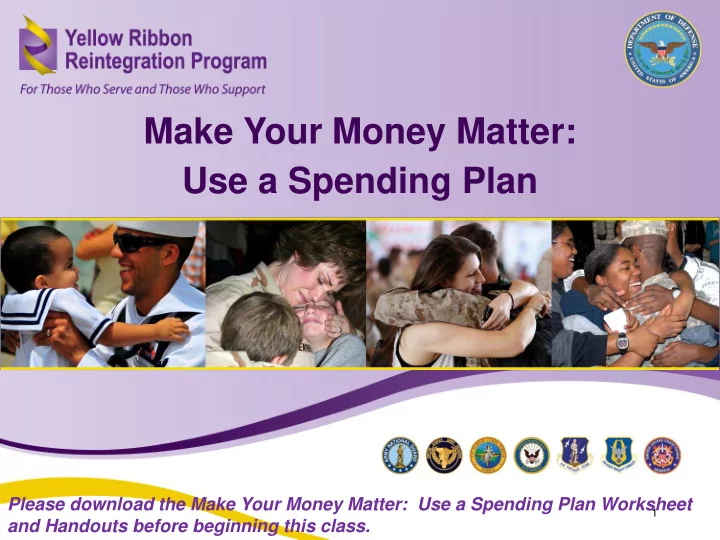

Make Your Money Matter: Use a Spending Plan Please download the Make Your Money Matter: Use a Spending Plan Worksheet 1 and Handouts before beginning this class.
SMART Goals SMART Goals Specific Measurable Attainable Realistic Time Bound State State the Determine Set a goal State when exactly dollar how it can that is the goal will what w ill amount be reached realistic for be reached be d one your situation and income 2 Making Your Money Matter: Use a Spending Plan
What is a Spending Plan? • A guide for spending money that is used to record planned and actual spending over a period of time. • Plans should be written on paper or electronic. • Tell your money where to go instead of wondering where it went. 3 Making Your Money Matter: Use a Spending Plan
Creating a Spending Plan Step 1--Track current 1. Track income and Income & Expenses expenses – Use a small 2. Create Your 5. Evaluate & Income & make Expense adjustments Categories notebook to record expenses – Keep receipts 3. Assign – Use cell phone note 4. Use and Money to each implement your Expense plan Category pad – Use debit card records 4 Making Your Money Matter: Use a Spending Plan
Creating a Spending Plan Step 2 — Create 1. Track Income & Expenses personal income & 2. Create expense categories Your 5. Evaluate & Income & – Customize to suit make adjustments Expense Categories your expenses. 3. Assign 4. Use and Money to each implement your Expense plan Category 5 Making Your Money Matter: Use a Spending Plan
Budget Components & Categories • INCOME • EXPENSES money you earn or receive on a items you spend money on somewhat regular basis – Savings/Emergency – Wages/Salary – Food – Alimony – Housing – Child Support – Utilities – Retirement income – Transportation – Social Security – Insurances – Public Welfare – Clothing – Disability income 6 Making Your Money Matter: Use a Spending Plan
Types of Expenses • Fixed Expenses : Stay the same each month – Rent, house payment, utility bills on budget plans, savings • Variable Expenses : Changes or varies each month – Groceries/food, non-budget plan utility bills, clothing, car repairs, gas • Periodic Expenses : Come one or more times each year at predictable times. – Auto insurance, property taxes, water bills 7 Making Your Money Matter: Use a Spending Plan
Creating a Spending Plan Step 3 — Assign 1. Track Income money to each & Expenses expense category 2. Create Your 5. Evaluate & Income & make – Allocate your Expense adjustments Categories income for the expenses 3. Assign – Income minus Money to 4. Use and each expenses should implement your plan Expense equal 0 Category 8 Making Your Money Matter: Use a Spending Plan
Factors Impacting Spending • Needs - essential for daily living • Wants - nice, but not necessary • Values - beliefs, what is worthwhile, desirable, or important to you • Goals - what we want to achieve 9 Making Your Money Matter: Use a Spending Plan
Creating a Spending Plan Step 4- Use the plan 1. Track Income & Expenses – Look for changes that can be made 2. Create Your 5. Evaluate & Income & make or that need to Expense adjustments Categories be made 4. Use and 3. Assign Money implement your to each Expense Category plan 10 Making Your Money Matter: Use a Spending Plan
Creating a Spending Plan Step 5- Evaluate 1. Track Income & Expenses the plan and adjust – Are you reaching 5. Evaluate 2. Create Your Income & & make Expense your goals? adjustments Categories – Are there plan changes that can be made? 3. Assign 4. Money to each Use/implement Expense your plan Category 11 Making Your Money Matter: Use a Spending Plan
Closing Thought “Any man can make money, but it takes a special kind of man to use it responsibly.” A.G. Gaston, Businessperson 1892-1993 12 Making Your Money Matter: Use a Spending Plan
Recommend
More recommend